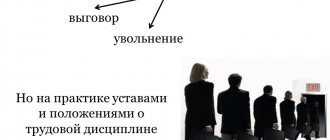Source: Magazine “Remuneration: Accounting and Taxation”
One of the grounds for dismissal at the initiative of the employer is dismissal due to repeated failure to fulfill job duties, if the employee has a disciplinary sanction (clause 5, part 1, article 81 of the Labor Code of the Russian Federation). However, when terminating an employment contract on this basis, the employer often makes mistakes, due to which the employee can be reinstated in his previous position. In this article we will consider in detail the procedure for dismissing a negligent employee, and also focus on its individual points.
Instead of a preface
First of all, it is necessary to determine what constitutes failure to fulfill labor duties. The main duties of the employee are established by Art. 21 Labor Code of the Russian Federation .
Labor functions are specified in more detail in employment contracts and job descriptions. Let us note that certain labor functions can be enshrined in other acts of the employer (for example, in orders). Naturally, the employee must be familiarized with his responsibilities by signature. In particular, Art. 68 of the Labor Code of the Russian Federation requires the employee to familiarize himself with the internal labor regulations, other local regulations directly related to the employee’s work activity, and the collective agreement. From this we can conclude that if the employment contract only stipulates the name of the position or profession (type of work), but does not specify the functions, and the employer forgot to familiarize him with the job description, then bring him to disciplinary liability for failure to fulfill job duties (and even more so dismiss him). under clause 5. part 1 of article 81 of the Labor Code of the Russian Federation ) will be very problematic. This conclusion is confirmed by judicial practice. Thus, the Perm Regional Court, in its Ruling dated May 14, 2014 in case No. 33-4192 , declared the orders to impose a penalty illegal and reinstated the employee in his previous position, and also recovered wages for the period of forced absence and compensation for moral damage due to the fact that in the absence of an official instructions and official familiarization with one’s official duties, it is impossible to establish the scope of the plaintiff’s duties and impute to him failure to fulfill duties.
Can being late for work be considered a failure to fulfill job duties? Yes, you can. The State Labor Inspectorate in St. Petersburg explained: since the employee is obliged to comply with internal labor regulations, being late can be considered a violation of labor discipline, for which the employer has the right to bring the employee to disciplinary liability, and in case of repeated lateness, even dismiss him.
In addition, according to paragraph 35 of Resolution No. 2 , failure by an employee to perform without good reason is failure to fulfill labor duties or improper performance through the fault of the employee of assigned labor duties (violation of legal requirements, obligations under an employment contract, internal labor regulations, job descriptions, regulations, employer orders, technical rules, etc.).
Such violations, in particular, include:
a) the employee’s absence from work or workplace without good reason;
b) refusal of an employee, without good reason, to perform labor duties in connection with a change in labor standards in accordance with the established procedure ( Article 162 of the Labor Code of the Russian Federation ), since by virtue of an employment contract, the employee is obliged to perform the labor function specified in this agreement, to comply with the internal labor rules in force in the organization regulations ( Article 56 of the Labor Code of the Russian Federation ).
We also note that dismissal under clause 5, part 1, art. 81 of the Labor Code of the Russian Federation is a measure of disciplinary liability, which means that the employer is obliged to comply with the procedure for bringing such liability established by Art. 192 , 193 Labor Code of the Russian Federation .
Thus, the Plenum of the Armed Forces of the Russian Federation in Resolution No. 2 indicated: when resolving disputes of persons dismissed under clause 5 of part 1 of Art. 81 of the Labor Code of the Russian Federation for repeated failure to fulfill labor duties without good reason, it should be taken into account that the employer has the right to terminate the employment contract on this basis, provided that a disciplinary sanction was previously applied to the employee and at the time of repeated failure to fulfill work duties without good reason, it has not been lifted and not repaid.
Let us note that if the disciplinary sanction is lifted or the employee violated labor discipline for the first time, then dismissal under clause 5 of part 1 of art. 81 of the Labor Code of the Russian Federation will most likely be declared illegal. For example, the Moscow Regional Court, having reinstated the employee at work, indicated that the dismissal procedure was violated, since the employee violated his job duties once, that is, there was no repetition ( Appeal ruling dated 06/04/2014 in case No. 33-12256/2014 ).
According to Part 2 of Clause 33 of Resolution No. 2, the application of a new disciplinary sanction to the employee, including dismissal under Clause 5 of Part 1 of Art. 81 of the Labor Code of the Russian Federation , is also permissible in the event that non-fulfillment or improper performance, through the fault of the employee, of the labor duties assigned to him continued, despite the imposition of a disciplinary sanction on him.
note
It should be borne in mind that the employer has the right to apply a disciplinary sanction to the employee even when, before committing the offense, he filed an application for termination of the employment contract on his own initiative, since the employment relationship in this case is terminated only after the expiration of the notice period for dismissal.
What reasons are considered valid?
Dismissal at the initiative of the employer is not allowed if the reasons why the employee did not fulfill his duties are valid:
- The manager did not provide the employee with a workplace or tools for work, although he should have.
- The equipment has broken down and repairs take time.
- The employee was in court, law enforcement, or a medical facility and was unable to complete tasks on time.
- The employer did not notify the employee about the change in labor standards, as required by law - two months in advance.
- The director did not create conditions for passing a medical examination, retraining, or passing exams.
Conclusion: the key factor is the employee’s intentional action or inaction. If he ignored the norms of legislation or local regulations, you can terminate the contract with him.
Features and procedure for dismissal of a disabled person of groups 1, 2, 3
The procedure and features of dismissal by agreement of the parties with compensation
Procedure for terminating an employment contract
So, when an employee commits a disciplinary offense (that is, if he fails to fulfill his labor duties) and if he wants to dismiss such an employee, the employer should first check the existence of a valid disciplinary sanction (find out whether it has not been removed or extinguished), as well as the legality of its application (established whether the labor duty, for failure to fulfill which the employee was subjected to punishment, was properly followed, whether the procedure for bringing to disciplinary liability was followed). For example, an employee was reinstated in his previous position and wages were recovered from the employer for the period of forced absence, since the disciplinary sanctions previously applied to the plaintiff at the time of his failure to fulfill his work duties without good reason were lifted and canceled ( Appeal ruling of the Murmansk Regional Court dated May 14, 2014 No. 33-1329 ).
For your information
According to Art. 194 of the Labor Code of the Russian Federation , if within a year from the date of application of the disciplinary sanction the employee is not subject to a new disciplinary sanction, he is considered to have no disciplinary sanction. The employer, before the expiration of a year from the date of application of the disciplinary sanction, has the right to remove it from the employee on his own initiative, at the request of the employee himself, at the request of his immediate supervisor or a representative body of employees.
1. We record the employee’s failure to fulfill his job duties. This is usually done by an act, official or memorandum. All documents confirming the employee’s failure to fulfill his duties must be registered in the manner established by the employer. Let us give an example of such an act.
Limited Liability Company "September"
Krasnodar August 12, 2014
Act
about failure to fulfill labor duties
I, the head of the marketing department, Igor Mikhailovich Dubinin, in the presence of senior marketer Anna Viktorovna Berezina and brand manager Oksana Ivanovna Lipova, have drawn up this act on the following.
On August 4, 2014, the head of the marketing department gave instructions to marketer Ivin Oleg Petrovich to collect information from consumers about satisfaction with goods, claims and complaints about goods. The report was due on August 11. Contrary to the requirements of clauses 2.5 and 2.7 of the job description, Ivin O.P. did not carry out the named actions to study the demand for goods and submit reports specified in the job description, and did not submit a report.
Failure to fulfill his official duties by marketer Ivin O.P. led to a decrease in the number of buyers, which resulted in a decrease in sales.
Ivin O.P. was asked to give a written explanation of what happened.
We confirm the above facts with our signatures:
Dubinin I. M. Dubinin
Berezina A.V. Berezina
Lipova O. I. Lipova
Ivin O.P. refused to sign this act, motivating his refusal by the absence of guilt.
2. We request explanations regarding failure to fulfill job duties. This is best done in writing, although there is no such requirement. We recommend that you request these explanations in writing, so that later, if a labor dispute arises, the employer can prove that the procedure for applying a disciplinary sanction was followed.
So, the notice of the need to provide explanations must be prepared in two copies: the employer gives one copy of the notice to the employee, and on the second copy (the employer’s copy), the employee writes that he has read the notice, received one copy, puts the date of receipt and signature.
If the employee provides a written explanation, it is reviewed by the employer and recorded in the appropriate register in accordance with the procedure established by him. If after two working days the employee has not provided the specified explanation, a corresponding act is drawn up ( Part 1 of Article 193 of the Labor Code of the Russian Federation ). Please note that if the employee does not provide an explanation, this is not an obstacle to applying a penalty.
If an explanatory note is nevertheless provided, it is necessary to check the validity of the reason for the employee’s failure to fulfill his work duties.
In addition, it is necessary to take into account all the circumstances of the disciplinary offense: the employee’s guilt, the severity of the offense, the circumstances of its commission, the employee’s previous behavior and his attitude towards work. For example, in the Determination of the St. Petersburg City Court dated July 4, 2013 No. 33-9355/2013 , the order to dismiss an employee under clause 5, part 1, art. 81 of the Labor Code of the Russian Federation was declared illegal because the employer did not provide evidence that the employee’s repeated lateness resulted in adverse consequences for the organization, that is, when making the decision to dismiss, the severity of the offense, as well as the employee’s previous behavior, were not taken into account.
If, after considering all the circumstances of the misconduct, the employer decides to simply punish the employee, an order for disciplinary action (reprimand or reprimand) is issued.
We will consider the case when a decision is made to fire an employee.
3. We check the deadlines established for applying disciplinary sanctions. According to Parts 3 , 4 Art. 193 of the Labor Code of the Russian Federation, disciplinary sanction is applied no later than one month from the date of discovery of the misconduct, not counting the time of illness of the employee, his stay on vacation, as well as the time necessary to take into account the opinion of the representative body of employees. Let us remind you that, by virtue of clause 34 of Resolution No. 2 , the day of discovery of the misconduct, from which the month period begins, is considered the day when the person to whom the employee is subordinate for work (service) became aware of the commission of the misconduct, regardless of whether he was assigned the right to impose disciplinary sanctions.
The following are not included in the one-month period for applying a disciplinary sanction:
- the time the employee was ill and on vacation;
- the time required to comply with the procedure for taking into account the opinions of the representative body of employees.
The absence of an employee for other reasons, including in connection with the use of rest days (time off), regardless of their duration (for example, during a rotational work schedule), does not interrupt the flow of the specified period.
One more point must be remembered: a penalty cannot be applied later than six months from the date the employee committed the offense, and based on the results of an audit, inspection of financial and economic activities or an audit - later than two years from the date of its commission. The specified time limits do not include the time of criminal proceedings.
Compliance with the deadlines for applying punishment is very important: if they are violated, the employee’s reinstatement will be inevitable, even if he actually does not fulfill his job duties. Thus, the employee’s claim to declare the dismissal illegal was satisfied due to a violation of the procedure for bringing to disciplinary liability: the penalty was imposed by the employer after one month from the date of discovery of the disciplinary offense ( Appeal ruling of the Supreme Court of the Komi Republic dated June 26, 2014 in case No. 33-3047/2014 ).
4. We check whether the employee belongs to the category of workers who cannot be dismissed at the initiative of the employer. Let us remind you that according to Part 6 of Art. 81 of the Labor Code of the Russian Federation, it is not allowed to dismiss an employee at the initiative of the employer (except in the case of liquidation of an organization or termination of activities by an individual entrepreneur) during the period of his temporary disability and while the employee is on vacation.
By virtue of Part 1 of Art. 261 of the Labor Code of the Russian Federation, termination of an employment contract at the initiative of an employer with a pregnant woman is not allowed, except in cases of liquidation of the organization or termination of activities by an individual entrepreneur.
Thus, the employee was reinstated at work, since his dismissal was made during the period of his temporary incapacity for work ( Appeal ruling of the Krasnoyarsk Regional Court dated May 21, 2014 in case No. 33-4103A-09 ).
5. We issue a dismissal order. Termination of an employment contract is formalized by order (instruction) of the employer ( part 1 of article 84.1 of the Labor Code of the Russian Federation ). The employee must be familiarized with such an order and signed. If this is impossible to do (the employee is absent or refuses to read the order), a corresponding entry is made on the order.
In addition, according to Part 6 of Art. 193 of the Labor Code of the Russian Federation , if an employee refuses to familiarize himself with the order, it is necessary to draw up a corresponding act.
As a basis for dismissal, the order must indicate the details of the previous order on the application of disciplinary measures to the employee, as well as documents confirming the next failure to fulfill his job duties (memos, acts, etc.).
6. We make an entry in the work book. According to clause 5.3 of the Instructions for filling out work books , approved by Resolution of the Ministry of Labor of the Russian Federation dated October 10, 2003 No. 69 , upon termination of an employment contract at the initiative of the employer, an entry about dismissal (termination of the employment contract) is made in the work book with reference to the corresponding paragraph of Art. 81 Labor Code of the Russian Federation . Let's give an example.
| Entry no. | date | Information about hiring, transfer to another permanent job, qualifications, dismissal (indicating reasons and reference to the article, clause of the law) | Name, date and number of the document on the basis of which the entry was made | ||
| number | month | year | |||
| 1 | 2 | 3 | 4 | ||
| 6 | 15 | 08 | 2014 | The employment contract was terminated due to | Order |
| with repeated failure to comply | dated 08/15/2014 No. 5-u | ||||
| without valid labor reasons | |||||
| duties, paragraph 5 of part one of Article 81 | |||||
| Labor Code of the Russian Federation | |||||
| Secretary Morozov | |||||
| M.P. | |||||
Remember that the employee must be familiarized with the record of dismissal against a signature in his personal card, which repeats the entry made in the work book ( clause 12 of the Rules for maintaining and storing work books , approved by Decree of the Government of the Russian Federation of April 16, 2003 No. 225 “On labor books" ).
After registration is made on the employee’s last working day, he must be issued a work book. The employee must confirm this fact with his signature in the book recording the movement of work books and inserts for them. If it is impossible to issue a work book on the day of dismissal due to the employee’s absence or refusal to receive it, the employer is obliged to send the employee a notice of the need to appear for the work book or agree to send it by mail. Upon written request from an employee who has not received a work book after dismissal, the employer is obliged to issue it no later than three working days from the date of the employee’s application.
7. We make the final payment. Based on Art. 140 of the Labor Code of the Russian Federation, upon termination of an employment contract, payment of all amounts due to the employee is made by the employer on the day of the employee’s dismissal. If the employee did not work on that day, the corresponding amounts must be paid to him no later than the next day after the dismissed employee submits a request for payment.
8. We complete the dismissal. The last stage of registration of dismissal may be the issuance of duly certified copies of work-related documents. This is done only if the employee asks the employer about this in a written statement.
But it is mandatory to issue a certificate of the amount of earnings for the last two years preceding dismissal. This is required by clause 3, part 2, art. 4.1 of the Federal Law of December 29, 2006 No. 255-FZ “On compulsory social insurance in case of temporary disability and in connection with maternity . Let us remind you that the certificate form was approved by Order of the Ministry of Labor of the Russian Federation dated April 30, 2013 No. 182n .
In addition, if the employee was liable for military service, information about his dismissal must be transferred to the military registration and enlistment office. Such information is submitted in the form given in Appendix 9 to the Methodological Recommendations for maintaining military records in organizations , approved by the General Staff of the Armed Forces of the Russian Federation on April 11, 2008.
Registration of the dismissal order in the appropriate journal
The drafted and signed order to terminate the employment contract is subject to registration in the logbook for registering orders for personnel. This journal records orders for all employees of the organization (IE), in particular, for admission, transfer, bonuses, business trips, dismissal, etc.
note
that orders for the first persons of the organization (manager, chief accountant and other persons, information about which is reflected in the charter) are registered in another journal - the journal for registering orders for core activities.
This document does not have a strictly established form and is developed by the employer independently.
The shelf life of the logbook for registering orders for personnel is 75 years
.
Journal of registration of orders for personnel ().
It's better to try to negotiate
However, before punishing an employee with dismissal “under the article”, we advise you to still agree with him on dismissal at his own request or by agreement of the parties. This is safer for the employer and beneficial for the employee (there will be no stain on the reputation). Why is that
- Even if an employee is fired legally, but complains to the labor inspectorate, then during the inspection they will check all personnel records . This will take away working time for the benefit of verification, and will add work to personnel and accounting.
- If an employee is fired illegally, there may be a demand to reinstate him at work, pay wages for the period of forced absence, pay legal expenses and, as a rule, compensate for moral damages. Reinstatement is carried out only by court decision. Employers often do not follow the procedure and make fatal mistakes that allow the former employee to recover.
- If the salary was partially paid “in an envelope” or the employee was not officially registered, he can file a complaint. If the information is confirmed and sent to the tax service, the Pension Fund and the Social Insurance Fund, then you will be charged additional taxes, insurance premiums, and also fined . It is clear that a gray salary is already a violation, and the consequences of a scandalous dismissal can paralyze the work of the organization and cause great financial damage, since the inspectorate and funds will insist on recalculation not only for the dismissed employee, but also for other employees.
Familiarization of the employee with the dismissal order
The employee must be familiarized with the order to terminate the employment contract against signature no later than three days from the date of its publication, not counting the time the employee is absent from work. If he evades or refuses to familiarize himself with the order, a corresponding note is made in the order, or an act of refusal to familiarize himself with the order is drawn up. An employee has the right to appeal a disciplinary sanction to the state labor inspectorate or commission for resolving labor disputes.
Nuances
In addition to the above situations, an employee can cancel his decision on dismissal through the court, the prosecutor's office or the labor inspectorate if he refused to perform actions that are consistent with his job duties, but could lead to harm to the health or danger to the lives of other people (Article 220 of the Labor Code ). Perhaps he was required to work in difficult and harmful conditions not provided for in the individual agreement, thereby violating the provisions of the law (Article 220 of the Labor Code).
Information
Another nuance lies in the very “validity of the reason” according to which the employee committed the violation. He, of course, can confirm his words with certificates. However, the “respectfulness” of actions is determined by the employer himself.
Payments
According to Art. 140 of the Labor Code, a citizen dismissed on this basis must be paid all the money due. This is done either at the time of dismissal, or the next day after the employee submits an application for payment. The amount due to him includes:
- Salary for the period worked, bonuses.
- Payment for unused vacation.
- Other payments provided for by law and local regulations.
A portion of the amounts due to the employee may be withheld to cover expenses incurred due to the resigning employee’s failure to comply with his job duties. For example, if due to his negligence the company’s property was damaged. In this case, they take only that part of the amount that does not exceed the full earnings.
Further, this fact (indicating the amount of payment and the withheld part) is recorded in the internal documentation of the enterprise and the employee’s income certificate.
Attention
It is prohibited to compensate from an employee’s salary for lost profits due to his failure to fulfill his duties.
Disciplinary action
Disciplinary action must be imposed immediately upon discovery of an employee's misconduct. If time is needed to study the circumstances of the violation, establish the severity of the offense itself and its consequences, and the guilt of the employee, the legislation allocates no more than 30 days for this.
Disciplinary punishment cannot be imposed on an employee if the violation became known after 6 months or the reasons for the violation were valid:
- emergency situations confirmed by housing and communal services certificates;
- medical documents about the illness of relatives;
- medical report on the state of health of the employee who violated his duties;
- participation in investigative actions of law enforcement agencies.
The reason for violations will be considered valid if it is confirmed by witness testimony and official documents.
Article 192 of the Labor Code of the Russian Federation establishes three types of disciplinary punishment for employees who do not fulfill their job duties:
- a reprimand is a punishment for a minor offense, an isolated incident that does not entail serious consequences;
- reprimand - a serious penalty for repeated or serious violations of labor discipline, refusal to perform one’s official duties;
- Dismissal is an extreme measure of punishment for gross violation of discipline, safety standards, failure to comply with job descriptions, or systematically repeated misconduct. Even one time!
Reference! The guilty employee cannot be punished with two penalties for the same offense. The penalty is valid for 12 months.
If the employee has corrected himself and does not commit new violations, the penalty against him can be lifted before the end of the calendar year, ahead of schedule.





